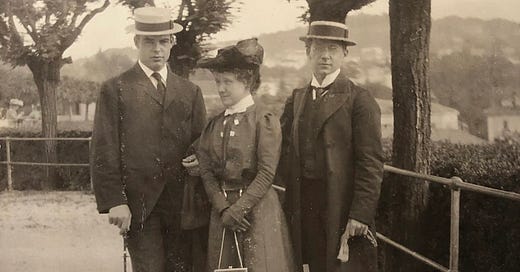Borden Wasn't Shy to Call Out Bad Preaching at Yale
Young Borden's Spiritual Maturity on Display in His Letters
This is the 10th in a series on the life of William Borden, the millionaire missionary who died en route to China's Gansu Province, adapted from his biography (BordenofYale.com), which I helped edit for republication (Aneko Press, Jan 1, 2024).
Even in the midst of intense language study and agressive evangelism in Egypt, Borden made time for what in earlier days he used to call his “long-distance work” – letters to people with whom he had spiritual contacts.
To a Mr. H., for example, he wrote from Cairo in early 1913:
I can sympathize with you in the matter of controlling your thoughts, for that is a thing we all have to fight for. You are right in saying we may commit great sins in our minds, though we do not do so outwardly. This is the view of sin which Christ gives us in the Sermon on the Mount, Matthew 5 and 6. However, I believe that in this as in all other things we can gain the victory by faith, through His aid, who was “tempted in all points like as we are, yet without sin.” . . .
The principle on which we want to work is to crowd out the bad with the good.* If we merely seek to put away evil without replacing it with active good, we may find that worse things come in. I have been helped by the suggestion that when we are tempted to harbor evil thoughts we should at once think of Christ, or repeat some verse of Scripture—in this way spoiling the picture, so to speak, by letting in a flood of light. Our object must be to bring “every thought into subjection to the obedience of Christ.” (2 Cor. 10:5)
Even during his freshman year at Yale, seven years earlier, Borden already showed a high level of spiritual discernment when listening to visiting preachers at chapel.
For instance, he wrote the following to his mother in November of 1905 about a “preacher with an international reputation” who “left much to be desired”…
Dr.— has been here for the last two Sundays, preaching in Chapel and talking in Dwight Hall in the evenings. He makes me tired, he’s so smooth and subtle and pleasing to everyone. His talks are interesting in a way, but what he says merely amounts to human ethics. He takes texts simply “as pegs to hang his own thoughts on.”
About a month later, he made this scathing observation in another letter…
In my opinion we get the saddest bunch of preachers you could scrape up in the U.S.A., and today we had one from Scotland who almost takes the cake.
In January of 1906, at the beginning of the second semester of his freshman year, Borden finally had some positive comments to make about the preaching:
The term has started well as far as sermons go. Mr. Speer was here this morning and evening and gave us two very good talks. In the morning he read a part of the tenth of Matthew, taking as his text verses 32 and 33, the subject being “Confession and Denial.” He spoke on character as essential to strong manhood, and religion as necessary to character, and showed that religion—Christianity—is a question of personal attitude toward Jesus Christ. It is confession or—denial.
The Dwight Hall meeting as you know is voluntary, but the room was packed, some fellows even standing, a thing they wouldn’t think of doing in Chapel. I guess there were about five hundred present. There, too, he gave a very powerful talk on “Apart from me ye can do nothing,” and “I can do all things through Christ which strengtheneth me.”
*The principle that Borden articulates in the first letter above sounds a lot like “The Expulsive Power of a New Affection”, originally preached by Thomas Chalmers (1819) and in recent years popularized by John Piper.




